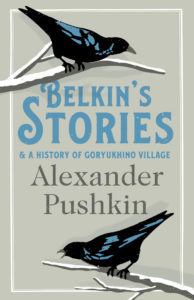 Belkin’s Stories (often known in English as The Tales of Belkin) is Pushkin’s first published work of prose fiction. It consists of a set of five short stories – The Shot, The Blizzard, The Undertaker, The Postmaster, and Young Miss Peasant. The stories are prefaced by a tongue-in-cheek foreword “From the Editor”, which purports to give information about the alleged compiler of the stories, one Iván Petróvich Belkin. But Belkin is himself a fictitious character, and the foreword has itself sometimes been termed a sixth story.
Belkin’s Stories (often known in English as The Tales of Belkin) is Pushkin’s first published work of prose fiction. It consists of a set of five short stories – The Shot, The Blizzard, The Undertaker, The Postmaster, and Young Miss Peasant. The stories are prefaced by a tongue-in-cheek foreword “From the Editor”, which purports to give information about the alleged compiler of the stories, one Iván Petróvich Belkin. But Belkin is himself a fictitious character, and the foreword has itself sometimes been termed a sixth story.
The work was first published in 1831. Pushkin had written it the previous autumn on one of his family’s estates east of Moscow, where he was marooned by a cholera epidemic that was raging across that part of Russia. He was also, at the age of 31, finally engaged to be married within months – an event that he was contemplating with a mixture of enthusiasm and foreboding. These circumstances account for the recurrent themes of marriage and death in the Stories. Nonetheless, the subject matter is treated with Pushkin’s usual lightness and irony.
On the surface, Belkin’s five stories are clear, fast-moving, easy to read. The plots hold the attention right up to the (usually surprising) denouement; the characters are well-drawn, true-to-life, and intriguingly open-ended; there is plenty of humour; and (save in the mock-formality of the Foreword) the writing is lucid and terse –“precision and brevity” were Pushkin’s watchwords for prose writing. Underneath, however, there are subtexts of parody, autobiographical reference and even (well hidden from the censor) social and political comment. More information on these subtexts is given in the notes on the text and in the Extra Material on Belkin’s Stories at the back.
The History of Goryúkhino Village is a separate work, but linked to the Stories through Belkin, its purported author. Pushkin began it at the same time as Belkin’s Stories, but left it unfinished, and it was never published in his lifetime. The History is a work of comic inventiveness, prefaced by a burlesque “autobiography” of Belkin that fills out the information supplied in the foreword to the Stories. It parodies (among other targets) the intellectual and literary pretensions of contemporary historians and ethnographers and ventures a guarded critique of conditions in the Russian countryside. Both the parody and the social comment are more overt than in the Stories, which is no doubt why, before Pushkin had completed the work, he realized that the censors would never pass it for publication.
See extracts from my translations: Belkin’s Stories; A History of the Village of Goryúkhino.